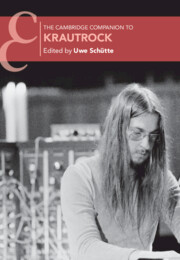Book contents
- The Cambridge Companion to Krautrock
- Cambridge Companions to Music
- The Cambridge Companion to Krautrock
- Copyright page
- Dedication
- Contents
- Illustrations
- Contributors
- Acknowledgements
- Note on Translation
- Introduction
- Part I Context
- Part II Music
- 6 Kraftwerk
- 7 Can
- 8 Tangerine Dream
- 9 Neu!
- 10 Faust
- 11 Cluster/Harmonia
- 12 Popol Vuh
- 13 Ash Ra Tempel, Manuel Göttsching, and Klaus Schulze
- 14 Amon Düül II
- 15 The Flip Side of Krautrock
- Part III Legacy
- Index
7 - Can
from Part II - Music
Published online by Cambridge University Press: 20 October 2022
- The Cambridge Companion to Krautrock
- Cambridge Companions to Music
- The Cambridge Companion to Krautrock
- Copyright page
- Dedication
- Contents
- Illustrations
- Contributors
- Acknowledgements
- Note on Translation
- Introduction
- Part I Context
- Part II Music
- 6 Kraftwerk
- 7 Can
- 8 Tangerine Dream
- 9 Neu!
- 10 Faust
- 11 Cluster/Harmonia
- 12 Popol Vuh
- 13 Ash Ra Tempel, Manuel Göttsching, and Klaus Schulze
- 14 Amon Düül II
- 15 The Flip Side of Krautrock
- Part III Legacy
- Index
Summary
This chapter explores the music, musicians, social and historical content, and reception of the ‘Krautrock’ band Can – formed by Holger Czukay, Irmin Schmidt, Michael Karoli, and Hans ‘Jaki’ Liebezeit. It does so by investigating the instigation of the band within its historical context and that of post-1945 German and international pop music, jazz, and new music. The chapter then discusses Can’s innovative, and in many ways unique, musical practice noting their growing successes in Germany and across Europe (particularly in Britain) and how this was received by fans and journalists. This discussion is divided into sections that discuss their practice, releases, and touring in relation to their vocalist at the time – Malcolm Mooney, Kenji ‘Damo’ Suzuki, and the latter period in which vocals were shared between the founder members. It concludes by exploring Can’s influence upon artists across genres including post-punk, indie, alternative and experimental rock, dance music, and hip-hop. The chapter argues that few bands encapsulated the internationally oriented and experimental European countercultural left quite like Can or left such an enduring template for musical practice.
Keywords
- Type
- Chapter
- Information
- The Cambridge Companion to Krautrock , pp. 112 - 125Publisher: Cambridge University PressPrint publication year: 2022

